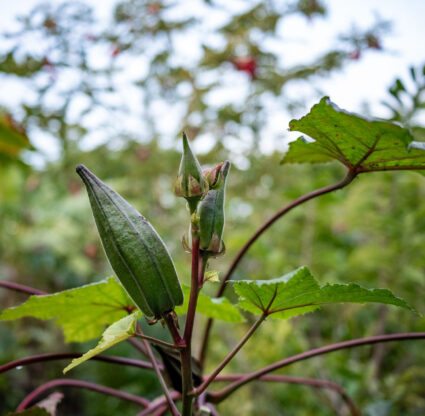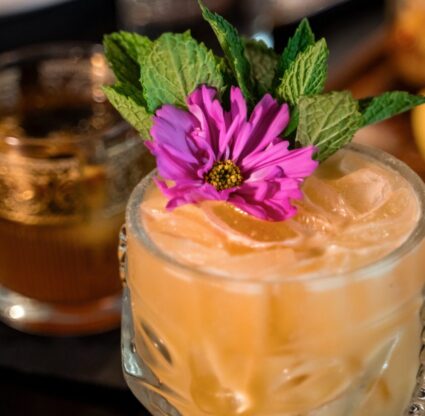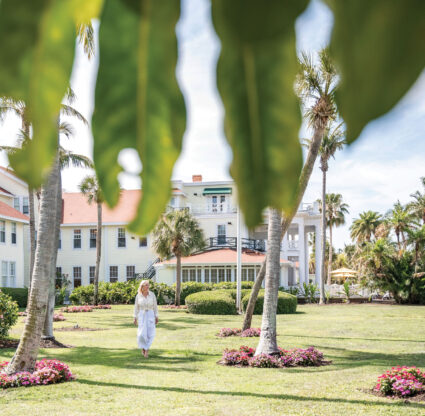When Nicole and Manny Cruz rise at 3:30 a.m., it is already sticky-hot across the couple’s 200-acre farm, located near the line between Lee and Hendry counties. Orange groves stretch for miles, surrounding the farm on all sides. Valencias covered in dew scent the air where the calving herds will soon graze, their coats pearlescent from a good rain the night before and the protein-rich grass they feed on all year. Nicole and Manny pull on mud-caked boots and step out of their unassuming ranch home into the dim light outside. In the distance, thousands of chickens, ducks and guinea hens craft a cacophony, clucking and churring as they peck the earth for worms and grubs. Nicole and Manny take one last sip of coffee and get onto the daily work of tending to Circle C Farm.
From the onset of their agricultural journey, the Cruzes have subscribed to regenerative agriculture, beginning with a homesteading project in 2010 on their small tract of land in Bonita Springs. The holistic approach includes promoting biodiversity, no-till farming, and pasture rotation, where herds change paddocks routinely, allowing the land to regenerate and the animals to forage without end.
By about 5 a.m., as Nicole finishes feeding the puffs of flaxen-colored fuzz in the chick brooder, Manny walks beyond the barn to the eastern pasture, pulling up portable fencing to create temporary paddocks. Alexandra, one of the couple’s three white, shaggy Maremma sheepdogs—an ancient Italian breed known for being loyal livestock guardians—follows dutifully along to help corral a small herd of Florida Cracker sheep, one of the oldest heritage breeds in the United States. The sheep, tan with a reddish-brown crimped fleece, have been grazing this paddock for three days and now need fresh, clean grass.
Grazing herds consume plants and grasses and give back to the land in the form of manure packed with healthy nutrients. The hardier, more fertile soil can absorb and retain more carbon, improving the air, the dirt itself and overall climate health. Nicole and Manny are conscious that agrifood systems account for about 30 percent of greenhouse gas emissions worldwide. By allowing nature to cycle itself, to function uninhibited, the farm’s footprint shrinks—and flourishes—simultaneously.
The idea boils down to farming in Mother Nature’s image, as indigenous communities did for millennia. Nicole and Manny don’t till the soil, which would contribute to erosion and loss of organic matter. The land remains pesticide-free. Duck eggs flaunt a charming speckled coloring, the natural staining that remains when eggs are laid on the earth, not in a cage, and blemished ova aren’t discarded to appease consumer aversions.
The plump, khaki-colored fowl lay at night, anywhere they can, forcing Nicole and her team of 10, mostly family, to comb the 30-acre paddock—dense with saw palmetto and bahiagrass—in search of the spotted treasures. But Nicole doesn’t mind. “They nurture us, take care of us, and we take care of them. Their life begins and ends here. We want to honor that,” she says, her curly, cardinal-colored hair fading into the now-late morning sun.
This is how things are supposed to work, I imagine, looking over the palm-footed land, with 80 head of premium Angus and Wagyu cattle roaming freely, grazing at will. Heritage Berkshire pigs play beneath the sun, nudging their snouts into the earth, and pregnant sows wallow in mud and root into the soil, where they’ll build their nest and soon give birth.
In 2017, Circle C Farm became Florida’s first and only on-farm federally inspected abattoir and butcher shop for red and white meat. ‘Abattoir’ is the French—and Nicole’s preferred—term for ‘slaughterhouse.’ “[It] better reflects the respect and care we show the animals,” she says. Only a few other farms in the U.S. do the rearing and harvesting in one place, with one team seeing the process from beginning to end.
Consumption is viewed on a nose-to-tail basis, and the bulk of the harvest goes direct to consumers, from pasture to plate, shipped nationwide or purchased at one of their two stores—one on the farm and the other in Downtown Bonita Springs.
Nicole and I tour the farm’s 40-foot, walk-in freezer, organized according to breed and cut. The Cruzes only harvest when they run out of all cuts of a particular animal. If they exhaust their popular pastured pork belly (a bacon-style cut), for instance, but are still well stocked on pork chops and country ribs, they’ll keep selling what they have until it’s gone. Only then is it time to process again. Bones are used for broths; fat turns into tallow for soaps and salves, and typically discarded scraps make for a nutritious, protein-packed grind for pets. Even the hides get a second life, sent to a Florida tannery, where they’re dried and sealed, then returned to the farm to be sold on-site as rugs or tapestries—a piece of the farm for the home.
Circle C has come a long way from its 2010 homesteading beginnings. Nicole, who grew up in Virginia with horses and her grandmother’s home cooking, found it increasingly difficult to eat commercially farmed meat and vegetables without getting sick, a sensitivity she attributes to the preservatives and other chemicals inherent to industrial farming. After meeting Manny, a descendant of a multigenerational farming family from the Dominican Republic, the pair began to dream of a small farm of their own. They thought, if nothing else, they could sustain themselves with what they grew.
Before long, they added chickens to their garden and started selling eggs to locals. The Cruzes found a community eager to embrace a supermarket alternative. As demand increased, customers wondered if Circle C might offer clean meats—chicken, duck, pork and beef—too. The couple decided to expand but needed more space to do it right. In 2012, they bought 129 acres in Felda—an unincorporated community in Hendry County, near Lehigh Acres—and an additional 80 acres in 2021.
Hurricane Irma represented a turning point in the couple’s approach. Three weeks after receiving their USDA certification, the storm took 11 of the farm’s 14 structures and most of their chickens, turkeys and ducks, along with a black and white Holstein cow, named Brownie, who believed she was a sheep. Irma devastated Southwest Florida’s agricultural community. It took Circle C six months to recover as they rebuilt structures, hatched and raised chicks, and otherwise worked to remeet the spectrum of nuanced agriculture requirements for Florida’s harsh climate. “We have to farm differently here. Whether it’s raining or lightning, the sky is orange or yellow, we’re on a tractor making sure the water can drain, making sure the pasture doesn’t flood, moving animals to drier ground,” Nicole says. “We’re out here doing what we can in a climate that is hot, hotter, hottest and wet, wetter, wettest.”
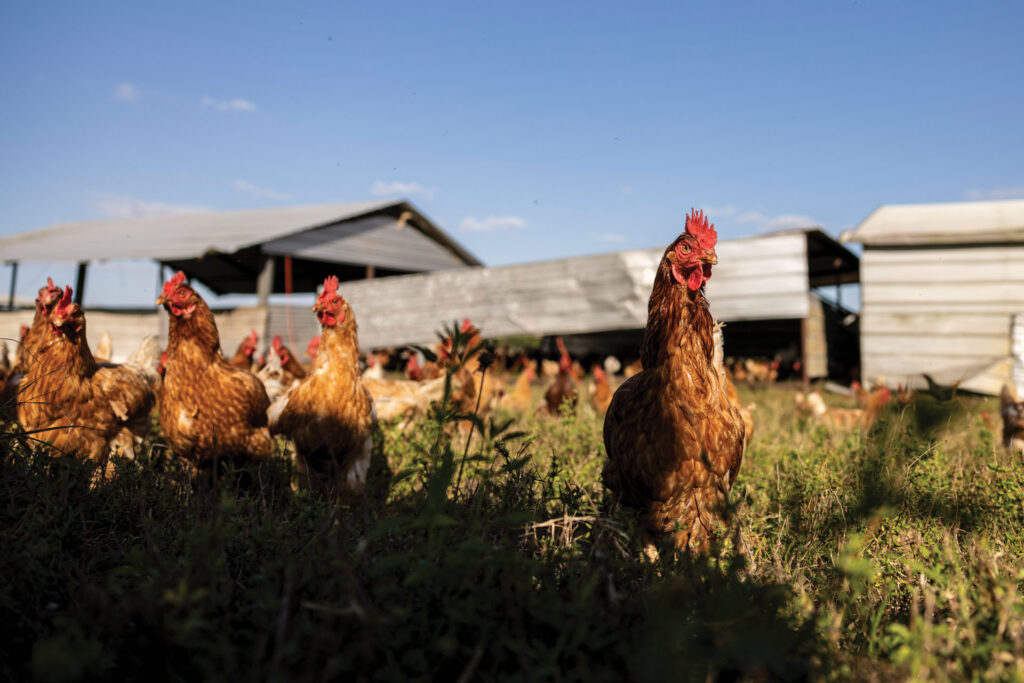
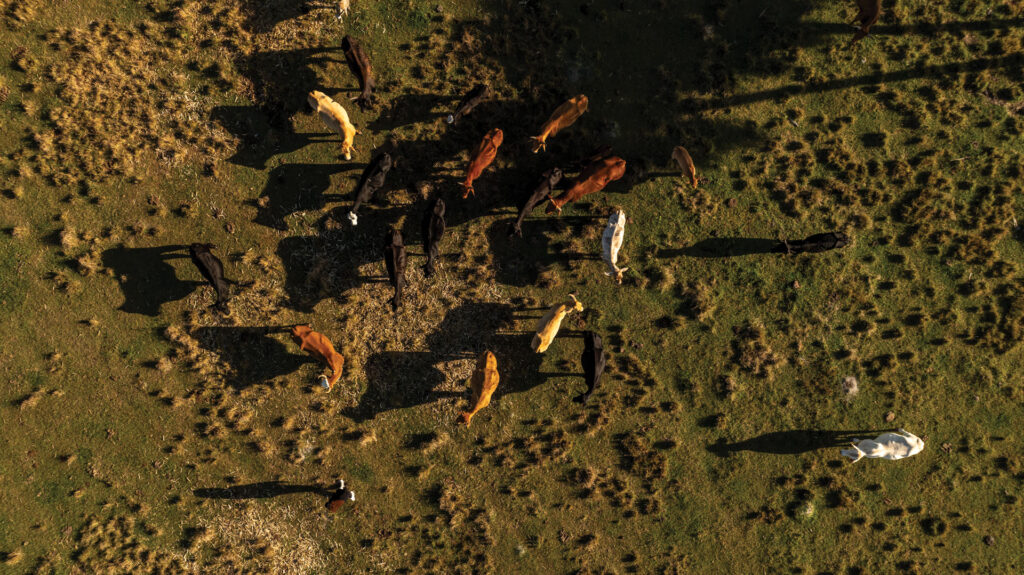
After the storm, Nicole and Manny started working with other local farms. At Circle C stores, the Cruzes now sell bread, quiches and pastries made with their eggs, alongside dairy products from a third-generation family farm in the Florida Panhandle, Joash Dairy. Baked goods are sweetened with Southwest Florida honey, and any produce not grown on-site is sourced from other local organic farms. “Not one of us can feed everyone,” Nicole says. “We have to work together—Florida farms feeding Florida families.”
Collaboration extends to the community; the couple encourages Floridians to know their food. Nicole’s background in education and strategic management gives weight to her efforts, including her podcast, where she delves into unknown facets of our community, local food systems and passionate people working to build a better Southwest Florida. “‘Cows or condos?’ is an oft-asked question around here,” she says. “The answer seems to be, overwhelmingly, ‘Condos.’ But who is going to feed them?”
She thinks about younger generations that show a renewed interest in homesteading but are unable to afford land, as well as those who came of age in a world of small family farms and now find it difficult to see the value in the work when a parcel of land can be sold for much more than it can produce. “Generational knowledge, if not handed down, takes with it a historical understanding of the land, of our land, our geographic space, our topography,” Nicole says. “It creates a void … that can in turn create a lack of food.”
Nicole believes Circle C’s blueprint can be replicated on a small or large scale, but the average person needs access to the infrastructure. “We have to find a way to maintain a food system that people can afford to participate in on both sides,” she says. “The farmer and the consumer. And we want that food to be clean.”
A big part of the reason Nicole and Manny decided to open a store at their farm was to offer a resource for Lehigh, a predominantly agricultural area that’s identified as a food desert for its lack of easy access to fresh, nutritious food. While there’s a necessary premium for slow-reared meats that makes grocery shopping at Circle C an investment, the Cruzes ensure the farm serves as a resource for all locals. At the store, families can pick up loaves of fresh-baked sourdough or have their own livestock harvested. The couple recently opened a scratch kitchen—a place for the community to gather over chorizo biscuits and gravy made with pork sourced from their pastures and a rotating selection of burgers.
All the beef comes from grass-fed and grass-finished cows, which means they eat off the land their entire lives instead of being fattened up with grain. There are no federal or other mandated certifications to carry labels like ‘organic’ or ‘grass-fed,’ and brands often exploit such terms for marketing purposes, so Nicole and Manny lean away from certifications and into telling their story, bringing people onto the farm, and lifting the veil on the production of clean food.
Nicole says there are enough farmers and fishers in Florida to feed the state and encourages people to eat within their foodsheds. “Communities must rally around them to ensure their survival,” she says. “For a farm to be here in six month’s time, to carry on from breeding to gestation to birth to growth—it just, it all takes time.”
Nicole looks to the moon dangling in the distance, ready to rise over canopies of hardwoods and citrus. She reaches out for Alexandra. Both human and animal feel the shift as the late afternoon turns to evening, making way for the night hawks, coyotes and panthers to feed in the mist. Alexandra will sleep with one eye open, keeping guard over the flock. Nicole and Manny will do the same. They understand the rhythms of this farm, a heartbeat indistinguishable from their own.
As we walk back toward the farm’s entrance, Nicole reflects on the early years, learning the pulse of this place. One inky night, a mama cow struggled to give birth. Nicole remembers taking a deep breath, measuring the rise and fall of her chest alongside the cows and placing both arms inside the animal, her fingers tracing the shape and position of the calf. The babe needed to be turned. Nicole gently guided the calf out into the twilight, with mother and child each taking their time now. As they should. Born, and grown, with love.

